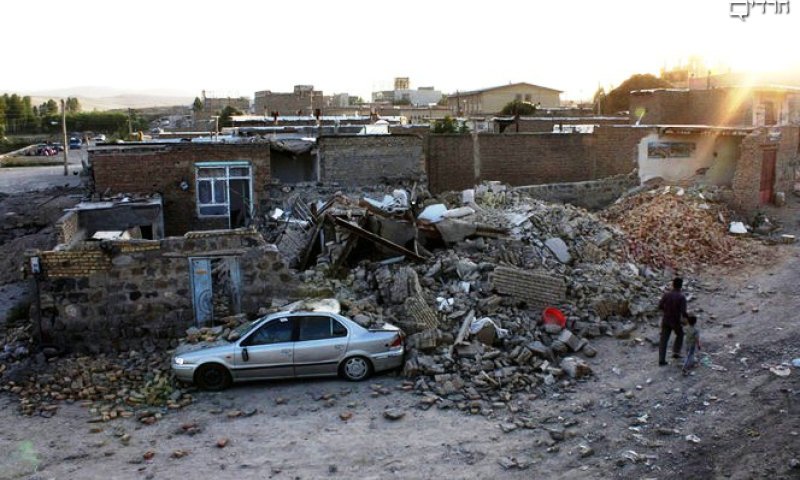
Iran: more than 300 killed in earthquake
As of now, it was reported about more than 300 dead and about 2,600 injured. The numbers might escalate as the ruins are evacuated. 6 villages were totally destroyed and 60 others damaged. Documentation
- Eli Schlesinger, Behadrei Hareidim
- כ"ד אב התשע"ב

AP
Two strong earthquakes were felt on Saturday in north-west Iran, one at a rate of 6.4 on the Richter scale, about 60 km from north-east to the city of Tibriz, 9.9km deep. And the second, about 10 minutes later, at a rate of 6.3. 6 villages were totally destroyed, and about half the buildings in 60 other villages were badly damaged.
The Pars news agency reported on Sunday that the number of dead has gone up to 300. Government factors say that there is a fear that the number of victims will continue to rise. The Isna news agency reported that about 2,600 people were injured as a result of the two earthquakes.
The Minister of the Interior, Hassan Gadami was quoted at the Pars news agency and said that altogether 110 villages were damaged in the quakes.
The residents of the villages were instructed by the authorities to stay out of their homes during the previous night, for fear of additional sub-quakes. The Turkish Red Crescent organization announced that it will send humanitarian equipment to the residents.
Iran is known as an area which is prone for disaster with everything pertaining to earthquakes. In 2003, a strong earthquake shook the area of the city Bam in south-east Iran and took the lives of 31,000 people.
The most deadly earthquake in Iran occurred in 1990 in the north-west of the country. It was 7.7 on the Richter scale and caused the death of about 37 thousand people, and another 100 thousand casualties. 27 towns and close to 2000 villages were destroyed in the quake.
The Pars news agency reported on Sunday that the number of dead has gone up to 300. Government factors say that there is a fear that the number of victims will continue to rise. The Isna news agency reported that about 2,600 people were injured as a result of the two earthquakes.
The Minister of the Interior, Hassan Gadami was quoted at the Pars news agency and said that altogether 110 villages were damaged in the quakes.
The residents of the villages were instructed by the authorities to stay out of their homes during the previous night, for fear of additional sub-quakes. The Turkish Red Crescent organization announced that it will send humanitarian equipment to the residents.
Iran is known as an area which is prone for disaster with everything pertaining to earthquakes. In 2003, a strong earthquake shook the area of the city Bam in south-east Iran and took the lives of 31,000 people.
The most deadly earthquake in Iran occurred in 1990 in the north-west of the country. It was 7.7 on the Richter scale and caused the death of about 37 thousand people, and another 100 thousand casualties. 27 towns and close to 2000 villages were destroyed in the quake.
תגובות
{{ comment.number }}.
הגב לתגובה זו
{{ comment.date_parsed }}
{{ comment.num_likes }}
{{ comment.num_dislikes }}
{{ reply.date_parsed }}
{{ reply.num_likes }}
{{ reply.num_dislikes }}



הוספת תגובה
לכתבה זו טרם התפרסמו תגובות